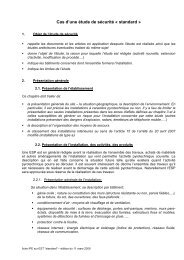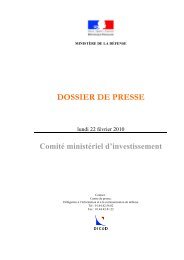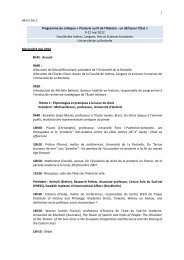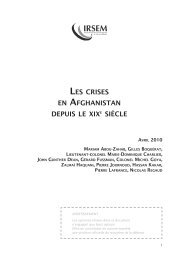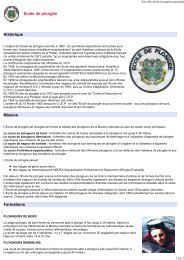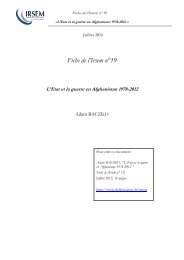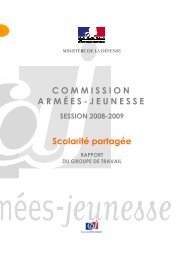Rapport Védrine_ENG_GERMAN - Ministère de la Défense
Rapport Védrine_ENG_GERMAN - Ministère de la Défense
Rapport Védrine_ENG_GERMAN - Ministère de la Défense
Sie wollen auch ein ePaper? Erhöhen Sie die Reichweite Ihrer Titel.
YUMPU macht aus Druck-PDFs automatisch weboptimierte ePaper, die Google liebt.
B. EUROPEAN VISIONS OF THE ALLIANCE<br />
The European Union’s official conception of security per se is that of complementarity with the Alliance.<br />
In reality, Europeans are <strong>de</strong>eply attached to the Alliance, starting with the countries that France thinks of<br />
first, each time that she attempts to revive the Europe of Defence, namely the United Kingdom and<br />
Germany. For Po<strong>la</strong>nd and the Baltic countries, the obligations of the United States un<strong>de</strong>r Article 5 are<br />
still the only serious guarantee against any resurgence of the Russian threat. All of the Allies approved<br />
of or called for the en<strong>la</strong>rgement of the Alliance and agreed to or urged the <strong>de</strong>velopment of a ballistic<br />
missile <strong>de</strong>fence. They agreed to external interventions (except for Germany in the case of Libya), but<br />
did not go so far as to respond favourably to the Americans’ calls for better bur<strong>de</strong>n sharing and<br />
increased capabilities, since they were actually cutting their <strong>de</strong>fence budgets. Just because they may<br />
also be "acting French” in calling for a fairer division of responsibilities, it does not mean that are really<br />
seeking one. It just means that domestic political, economic and social priorities are much more<br />
compelling and they hope that the United States will remain un<strong>de</strong>r an obligation to ensure the security of<br />
the European continent. They do not see any contradiction between maintaining their s<strong>la</strong>vish or passive<br />
positions at NATO and paying lip service to <strong>de</strong>veloping a Europe of Defence, which is an abstract goal<br />
that they support as long as it does not entail any risk of redundancy with NATO’s action. This attitu<strong>de</strong> is<br />
consistent with the vision in which the European Union, which does not need to become a world power,<br />
will manage to set the pace or protect its interests on the strength of its soft power and its normative<br />
power.<br />
C. AMERICAN VISION OF THE ALLIANCE’S FUTURE<br />
First of all, the Americans are once again looking at the world in strategic terms, much more than they<br />
did during their triumphant years as a hyperpower in the nineteen-nineties.<br />
Not one American lea<strong>de</strong>r or expert has ever questioned the Washington Treaty, yet. The commitment of<br />
the Allies, starting with the United States, to the 1949 At<strong>la</strong>ntic Alliance Treaty is reaffirmed at each<br />
Summit. Before the Chicago Summit, Presi<strong>de</strong>nt Obama <strong>de</strong>c<strong>la</strong>red: “With no other group of nations do we<br />
have such a close alignment of values, capabilities and goals. NATO is not simply the foundation of our<br />
trans-At<strong>la</strong>ntic re<strong>la</strong>tionships, it is the cornerstone of American engagement with the world."<br />
The American government also <strong>de</strong>nies that the repositioning of its forces to Asia, the “pivot to Asia”,<br />
where one third of the US Navy ships with be concentrated as of 2020, as Hil<strong>la</strong>ry Clinton exp<strong>la</strong>ined in<br />
her article entitled “America’s Pacific Century”, and that the withdrawal of two of the four combat<br />
briga<strong>de</strong>s stationed in Europe (7,000 troops out of 81,000) signal the abandonment of Europe, which<br />
would be unthinkable anyway for the world's leading power, if it wants to maintain its global role. It<br />
cannot be <strong>de</strong>nied that the European theatre is not a priority for the United States, that there is no direct<br />
military threat to Europe, nor any specific threat at this time, except the economic crisis, that capabilities<br />
in Europe are steadily diminishing, that there is little <strong>de</strong>sire to take military risks, and that the Americans<br />
do not see their European partner as indispensible at the global level, even though it may be invaluable<br />
in certain theatres of action. However, NATO is still seen as helpful for enhancing American influence,<br />
since it is the only European organisation that has the United States as a member.<br />
But what Americans really think was probably said best on 10 June 2011 by Robert Gates, George W.<br />
Bush’s Secretary of Defence, who agreed to keep his post until 2011 un<strong>de</strong>r Presi<strong>de</strong>nt Obama. Noting<br />
that Europeans' <strong>de</strong>fence spending had <strong>de</strong>clined by 15% since 11 September 2011; that only three<br />
13



